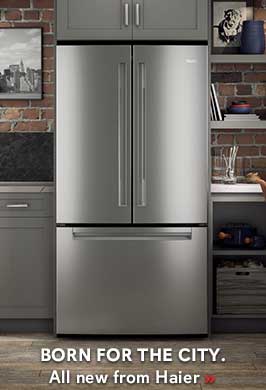
Electric or Gas: Finding the Best Cooktop
July 25, 2024
If you’re in the market for the best cooktops to elevate your kitchen game, you've likely encountered the age-old debate: gas or electric? This choice isn't just about aesthetics—it's a decision that can profoundly shape your cooking experience and even influence the dishes you create.
This isn't a futuristic fantasy; it's the reality smart laundry appliances offer.
In this guide, we'll fire up some hot debates: Does gas really offer better control? Are electric cooktops easier on your wallet? And what's all the buzz about electric? We'll help you find the cooktop to suit your cooking needs.
Gas Cooktops: Pros and Cons

Gas cooktops are a classic choice and a favorite among many professional chefs. Here’s why:
Pros:
- Precise Temperature Control: Gas cooktops let you adjust the heat instantly, giving you precise control over your cooking. This is perfect for delicate sauces or quick sears.
- Instant Heat: No waiting around! Gas burners heat up immediately, so you can start cooking right away.
- Visual Feedback: The visible flame makes it easy to see how hot your burner is, which can be super helpful.
Cons:
- Safety Concerns: Open flames and gas leaks are potential risks, so proper ventilation and safety measures are a must.
- Installation Costs: If your kitchen doesn’t already have a gas line, installing one can be pricey.
- Cleaning Challenges: Gas cooktops can be a bit of a hassle to clean, with grates and burners that can collect grease and food debris. Seek gas cooktops with dishwasher-safe grates.
Electric Cooktops: Pros and Cons
Electric cooktops offer a different set of benefits and drawbacks. Let’s break it down:
Pros:
- Cost-Effective: Generally, electric cooktops are less expensive to buy and install.
- Easy to Clean: Smooth-top electric cooktops are a breeze to clean—just wipe them down!
- Consistent Low Heat: Electric cooktops are great for tasks that require steady, low heat, like melting chocolate or simmering sauces.
Cons:
- Slower Heat Response: Electric burners take a bit longer to heat up and cool down, which can be less convenient.
- Less Precise Control: Adjusting the temperature isn’t as immediate as with gas, making it harder to achieve precise control.
- Dependent on Electricity: If there’s a power outage, you won’t be able to use your cooktop.
How Do Induction and Electric Cooktops Differ?
When searching for electric cooktops, you may come across induction options. Electric cooktops use heating elements situated beneath the glass surface to cook food. When you activate a burner, it produces heat that travels to the glass surface, which then heats the cookware placed on top of it.
Induction cooktops, on the other hand, operate differently. They create electric pulses that are transferred directly to the cookware, which must be magnetic for this process to work. This method heats the pan directly, bypassing the need for the glass surface to act as a conductor of heat.
Both options are similar in their benefits. If you go for an induction option, consider the following factors:
- Cookware Compatibility: Ensure your existing pots and pans are compatible with induction cooking. Induction cooktops require magnetic cookware, such as cast iron or some stainless steel.
- Efficiency: Induction cooktops are typically more energy-efficient because they heat the cookware directly, leading to less heat loss.
- Safety: Since induction cooktops don’t heat the surface, they remain cooler to the touch, reducing the risk of burns.
- Control: Induction cooktops offer precise temperature control, allowing for quick adjustments and consistent cooking results.
- Cost: Induction cooktops tend to be more expensive upfront compared to traditional electric cooktops. Consider your budget and how often you cook when making a decision.
- Noise: Some induction cooktops may produce a humming noise during operation, which could be a factor if you prefer a quieter cooking environment.
How to Make Your Decision
Choosing the right cooktop is all about assessing your needs and preferences. Here’s a quick guide to help you decide:
- Assess Your Needs: Consider the types of dishes you cook most often. Gas or electric might be best for precise temperature control, while electric could be ideal for consistent low heat.
- Consider Your Budget: Factor in the initial cost, installation expenses, and long-term energy costs. Electric cooktops are usually cheaper upfront, while gas and electric might save on energy bills over time.
- Evaluate Your Kitchen Setup: Check if your kitchen is better suited for gas or electric based on existing infrastructure. Installing a gas line can be costly if you don’t already have one.
- Think About Safety: Consider the safety features of each type and choose one that fits your household’s needs. Induction cooktops are great for families with small children or pets, as they reduce the risk of accidental burns.
- Prioritize Cleaning and Maintenance: Decide how much time you’re willing to spend on cleaning. Smooth-top electric cooktops are easier to clean, while gas cooktops might require more effort.
Our Top Cooktop Recommendations
We pride ourselves on offering a wide range of high-quality cooktops from top brands to suit every kitchen and cooking style. Based on customer feedback, expert reviews, and our own experience, here are four top-rated cooktops we highly recommend:
Gas Cooktops
1. Thermador 36'' Stainless Steel Gas Cooktop
(Model: SGSXP365TS)
Perfect for: Home chefs who love precise temperature control and ample cooking space.
Features:
- 36-inch cooking space with five burners
- Star® Burner for equal flame distribution
- Continuous grates for easy pan movement
- ExtraLow® simmering technology
2. GE® 36" Built-In Gas Cooktop with Dishwasher-Safe Grates
(Model: JGP3036SLSS)
Perfect for: Families who need a reliable, easy-to-clean cooktop with powerful burners.
Features:
- Dishwasher-safe grates for easy cleaning
- Five sealed burners, including a 15,000 BTU Power Boil burner
- Deep recessed cooktop contains spills
Electric Cooktops
3. Bosch 800 Series 30" Induction Cooktop
(Model: NIT8060UC)
Perfect for: Smaller kitchens that need powerful, safe, and versatile cooking options.
Features:
- Four induction elements with 17 power levels
- AutoChef® temperature regulation
- SpeedBoost® for faster boiling
- Child lock for safety
4. Frigidaire 30" Electric Cooktop
(Model: FFEC3025UB)
Perfect for: Budget-conscious shoppers looking for a non-induction and reliable electric cooktop.
Features:
- Four elements
- SpaceWise® Expandable Elements
- Color-coordinated knob controls
- Easy-to-clean ceramic glass surface

Choosing between gas, electric, or electric cooktops depends on your cooking habits, kitchen setup, and personal preferences. If you’re still not sure which type of cooktop to choose, visit one of our appliance store locations in Portland, OR, or contact us. Our goal is to ensure you leave our store confident in your choice and excited about your new cooktop.
Standard TV & Appliance also offers a range of in-stock appliances for sale, including dishwashers, refrigerators, ovens, ranges, and more options from renowned brands like Bosch, KitchenAid, Cove, and GE Profile.
Related readings:
- Induction vs Electric vs Gas: Which Cooktop Should I Buy?
- The Advantages Of Built-In Appliances
- 5 Must-Have Kitchen Appliances For The Modern Home Chef
Frequently Asked Questions About Cooktops
What are the main differences between gas and electric cooktops?
Gas cooktops offer precise temperature control and instant heat, while electric cooktops are generally less expensive and easier to clean. Electric cooktops provide consistent low heat but take longer to heat up and cool down.
Are electric cooktops better than gas or electric?
Electric cooktops combine the best features of both gas and electric cooktops, offering precise control, fast heating, and energy efficiency. However, induction cooktops require compatible cookware and are sometimes more expensive.
What should I consider when choosing a cooktop?
Consider your cooking style, kitchen layout, energy costs, safety, and cleaning preferences. Assess your needs and budget to determine which type of cooktop is best for you.
Can I install a gas cooktop if my kitchen doesn’t have a gas line?
Installing a gas cooktop without an existing gas line can be expensive, as it requires professional installation of the gas line. Consider the costs and feasibility before making a decision.













